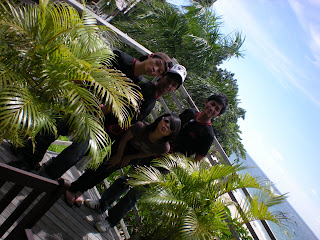
Jumaat, 10 Julai 2009
Isnin, 27 April 2009
Khamis, 2 April 2009
Selasa, 31 Mac 2009
Isnin, 30 Mac 2009
Khamis, 19 Mac 2009
Ahad, 8 Mac 2009
THE VERTICAL COMMUNICATION
Based in my research in the vertical communication in upward and downward in 3 types of book, the are management A. pacifir Rim Focus (4 edition) by Mc Graw Hill Irwin, A problem –solving process by Kreitner (Arizona state university) and Management leadership in action by Mosley/Pietri/Megginson, found that a meaning, what is upward and downward and the differed of this 2 communication skill.
Upward communication is the vertical flow communication from a lower level to one or more higher level in the organization. This is a process by which subordinates are systematically encouraged to share their feelings and idea with management. Upward communication includes one to one meetings with the immediate superior, staff meeting with superior, memos and report, suggestion systems, grievance procedures and employee attitude surveys.
The communication that flow the organization normal chain of common from top to bottom is called downward communication. It tends to follow and reflect the authority – responsibility relationship shown in the organization chart. Downward communication is used to inform, direct, coordinate and evaluate employees. when managers assign goals tom their employees ,they using downward communication. The manager also using tis communication by providing employees with job decryptions, informing them of organization policies and procedures, pointing out problems then need attention, or evaluating they performance. This also can take place through any of the communication methods we describe earlier.
This is example of understanding as information is transmitted:
Original Message
100 %
Chief executive officer and boards understanding
60 %
Vice president understanding
50 %
General supervisor understanding
40 %
Plant manager’s understanding
Looser in underastanding looser in understanding
30 %
Foreperson’s understanding
20 %
Production line worker’s undrestanding
Final Message
The different of upward and downward:
Downward
-Specific requests From uppers levels
· Open door policy ( sub ordinates feel free to walk in anytime and talk with them)
· Informal grief sessions (employees may feel free to air their feeling if they are confident that management will not criticize or penalize them).
· Task forces ( multilevel participation in a task force encourages close contact between manager and subordinates, and interpersonal skills)
· Exit interview ( an employee leaving the organization for whatever reason, no looser has a fear of recrimination from superiors)
Performance- related reports in dictating result, progress or problems.
Upward
· Specific requests for information from lower levels
· Feedback about performance
· Work assignment and directives
· General information about the organization such as its progress or status.
· Job rationales explaining relationship between tasks
· Attempts to encourage a sense of mission and organizational goal dedication
Upward communication is the vertical flow communication from a lower level to one or more higher level in the organization. This is a process by which subordinates are systematically encouraged to share their feelings and idea with management. Upward communication includes one to one meetings with the immediate superior, staff meeting with superior, memos and report, suggestion systems, grievance procedures and employee attitude surveys.
The communication that flow the organization normal chain of common from top to bottom is called downward communication. It tends to follow and reflect the authority – responsibility relationship shown in the organization chart. Downward communication is used to inform, direct, coordinate and evaluate employees. when managers assign goals tom their employees ,they using downward communication. The manager also using tis communication by providing employees with job decryptions, informing them of organization policies and procedures, pointing out problems then need attention, or evaluating they performance. This also can take place through any of the communication methods we describe earlier.
This is example of understanding as information is transmitted:
Original Message
100 %
Chief executive officer and boards understanding
60 %
Vice president understanding
50 %
General supervisor understanding
40 %
Plant manager’s understanding
Looser in underastanding looser in understanding
30 %
Foreperson’s understanding
20 %
Production line worker’s undrestanding
Final Message
The different of upward and downward:
Downward
-Specific requests From uppers levels
· Open door policy ( sub ordinates feel free to walk in anytime and talk with them)
· Informal grief sessions (employees may feel free to air their feeling if they are confident that management will not criticize or penalize them).
· Task forces ( multilevel participation in a task force encourages close contact between manager and subordinates, and interpersonal skills)
· Exit interview ( an employee leaving the organization for whatever reason, no looser has a fear of recrimination from superiors)
Performance- related reports in dictating result, progress or problems.
Upward
· Specific requests for information from lower levels
· Feedback about performance
· Work assignment and directives
· General information about the organization such as its progress or status.
· Job rationales explaining relationship between tasks
· Attempts to encourage a sense of mission and organizational goal dedication
Jumaat, 6 Mac 2009
Langgan:
Ulasan (Atom)




























